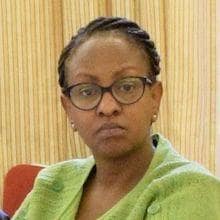Empowering Her, Health for All

- Health at Bayer
-
Pharmaceuticals
- Treatment Areas
- Innovation & Technologies
- Cell and Gene Therapy
-
Sustainability
- Patient Access Charter
- Leadership Perspective
- Strengthening Healthcare Access
- Moving Non-Communicable Diseases Care Forward
- Ensuring a Sustainable Product Supply
- Delivering Better Cancer Care
-
Empowering Women, Globally
- Boosting Family Planning Usage through Digital Channels
- Capacity building: Addressing Root Causes through Partnerships
- Impact at Scale: The Challenge Initiative
- Promoting Awareness: World Contraception Day (WCD) & the Your Life Campaign
- Providing Accessible and Affordable Contraceptives
- Enabling Family Planning in Humanitarian Settings
- Fighting Neglected Tropical Diseases
- Transparency
- News & Stories
- Personal Health
- Report a Side Effect
- Medical Counterfeits
In partnership with The Challenge Initiative (TCI), we are proud to share stories that illustrate the positive impact that family planning has on women and low-income communities around the world. Published monthly, these stories aim to capture the perspectives of women and their communities that benefit from TCI’s efforts and the dedicated individuals working to empower women with access to family planning.
What’s Up? WhatsApp! – The Family Planning Conversation Goes Digital
How many times have you scrolled through your social media profiles today?
In recent years, the role and reach of social channels – such as Facebook, WhatsApp, Instagram and Telegram – have expanded across the globe. Users log in to engage with friends and family, scope out new fashion trends and dance moves, and keep up with their favorite influencers. However, in some parts of the world, social media not only bring entertainment to viewers' lives – they serve as engagement and information forums that can make their lives healthier and safer.
As Fatimata Sow, Communications and Programs Manager for IntraHealth International (TCI's Francophone West Africa hub partner), notes, these modern, interactive platforms offer new and convenient opportunities for local health advocates to share messaging and generate conversation around sexual health and family planning topics.

As the world becomes more digitally driven, people in low-and middle-income countries (LMICs) are increasingly open to exploring new possibilities through technology. Notably, many LMICs are leapfrogging technological innovation, or skipping past older and less efficient technologies (such as mobile phones) in favor of more advanced ones (such as smartphones).
While modern communication channels also present unique challenges (namely ensuring accuracy across conversations and shared information), the opportunity to normalize family planning conversations offers boundless potential for an organization such as TCI which prioritizes extending access to and delivery of quality family planning services to broader populations.

Awareness through Access
As Njeri and her team are all too aware, accessing digital services can prove to be more difficult than accessing the information – especially in rural areas. Njeri underlines the importance of removing financial barriers to technology across East Africa – namely, the value of expanding internet service to allow healthcare workers to promote and direct populations to health facility websites, provide contact points, and outline services to help them find the best provider for their needs.
Dialing up Data-Driven Discussion

In India, PSI Senior Knowledge Management Specialist Deepti Mathur quickly recognized that municipalities and public health systems should align their strategies with proven solutions and translate information into action. If the opportunity that digital platforms provide is not captured now, she wondered, how could they possibly serve women and girls in need?
To better understand and serve the needs of the community, TCI has developed and deployed localized apps that aggregate local health information, identifies patterns in non-users and provides guidance to city health stakeholders across the value chain including the last mile community health worker. Accredited Social Health Activists (ASHAs) respond to meeting their family planning needs by distilling the collected information by age and number of children a woman has and make better routine plans to reach and refer them to facilities.
Sharing Wisdom Via WhatsApp

Long considered taboo for in-person engagement, sexual health topics are finding new life across digital forums and global communities. “Social forums in particular have become havens for young girls displaced from their support networks after marriage”, observed Deepti.
The common thread is WhatsApp. This globally used messaging app enables safe information exchange between populations, healthcare providers, local health management teams, and government officials. Beyond providing links and downloadable resources, local WhatsApp chat groups offer family planning coaching, Q&A and even basic telehealth services. In doing so, leaders of these WhatsApp groups often emerge as trusted and reputable sexual health sources.
"Among city health management teams in East Africa, the WhatsApp groups almost have become a point of competition", added Njeri. "Cities look at how others are doing nearby and become interested not only in doing a similar group themselves but offering something unique and better."
A Digital Future
Fatimata in particular believes that technology "needs to be integrated into all high-impact sexual and reproductive health interventions to define what is correct and necessary and change how we do things for the better."
Even as new platforms and forums for dialogue continue to emerge, digital and social media already are proving to be change makers in expanding awareness and generating support as well as excitement for family planning.
By Youth, For Youth: How Young Leaders are Reshaping the Global Reproductive Health Conversation
For some young adults, the greater comfort lies in holding personal discussions with peers more likely to understand and relate to their situations. To meet their needs, and serve their communities, a dedicated and emerging class of youth leaders is taking ownership of – and redefining – the next wave of the global family planning conversation.
In our next feature, we will explore the new tactics and approaches young leaders are taking to offer resources and support to their communities, and also spotlight several of the individuals leading the charge.












